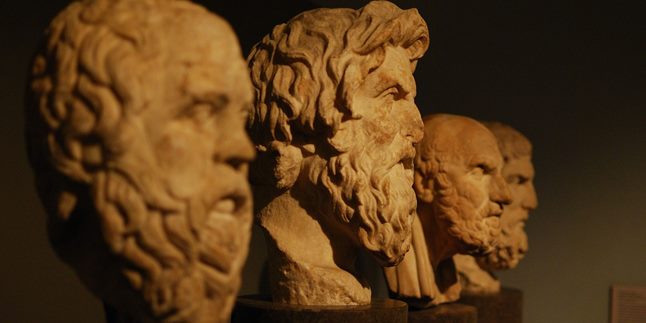Kapanlagi.com - Philosophy is a study of all human experiences. What exists in philosophy includes something to build theories about humans and is presented as a foundation for beliefs. In addition, philosophy critically examines things that can be used as a basis for attitudes and beliefs. But what is the actual meaning of philosophy?
The meaning of philosophy itself has many variations, KLovers. There is a meaning of philosophy that you can understand in general, and there is also the meaning of philosophy according to various experts. Although they may differ slightly, some have similarities. In addition to understanding the meaning of philosophy, KLovers can also understand various branches of philosophy and their characteristics.
So, for KLovers who want to know and understand the meaning of philosophy. You can understand the meaning of philosophy in general or according to experts. In addition, you can also learn about the branches of philosophy and their characteristics. Let's check it out, KLovers.
1. Meaning of Philosophy in General

Illustration (credit: Pixabay)
Now, before KLovers understand more about philosophy, you need to know the meaning of philosophy in general first. Etymologically, the meaning of philosophy is the love of wisdom, while the person or practitioner who studies philosophy is called a philosopher. The person who first used the word philosophy is a philosopher from Greece named Pythagoras (582-496 BC).
According to KBBI (Indonesian Dictionary), philosophy is knowledge and investigation with reason and intellect regarding the essence of everything that exists, its cause, and its laws. Philosophy is also defined as a theory that underlies the realm of thought or an activity, and a science that focuses on logic, aesthetics, metaphysics, and epistemology.
In general, philosophy is a study of fundamental and general issues such as existence, knowledge, values, reason, thought, and language. In a broader sense, philosophy is an activity that people engage in when they try to understand the fundamental truths about themselves, the world they live in, and their relationships with the world and each other.
Furthermore, according to Britannica, the meaning of philosophy is the rational, abstract, and methodical consideration of reality as a whole or as fundamental dimensions of human existence and experience. Philosophical inquiry is a central element in the intellectual history of many civilizations.
2. Meaning of Philosophy from Experts

Illustration (credit: Pixabay)
Not only is there a general meaning of philosophy, but KLovers can also understand the meaning of philosophy from various experts. Yes, some experts share how to understand the meaning of philosophy. Here is the meaning of philosophy from these experts:
1. Plato
According to Plato (427-347 BC), philosophy is the science of nature. Philosophy is an effort to achieve knowledge and understand the true truth.
2. Aristotle
According to Aristotle (384-322 BC), the meaning of philosophy is the science of truth that includes logic, physics, metaphysics, and practical knowledge.
3. R. Berling
According to R. Berling (1968), the meaning of philosophy is a great thought inspired by reason about everything that comes from experience.
4. Bertrand Russel
The meaning of philosophy is nothing more than an attempt to answer ultimate questions, not shallowly or dogmatically like we do in everyday life and even in science.
5.W.J.S Poerwadarminta
The meaning of philosophy is knowledge and investigation with reason about causes, principles of law, and so on from everything that exists in the universe or knowing the truth and the meaning of "existence" of something.
6.Immanuel Kant
Immanuel Kant formulates philosophy as the science that is the foundation and pinnacle of all knowledge that encompasses four questions:
What can we know? (Metaphysics)
What should we do? (Ethics)
Where does our hope reach? (Religion)
What is the nature of man? (Anthropology)
3. Branches of Philosophy

Illustration (credit: Pixabay)
In fact, philosophy also has branches that KLovers can know and understand. And it is these branches that distinguish one philosophy from another, such as categorizing types of philosophy. And here are some branches in the world of philosophy:
1.Metaphysics
Metaphysics is a systematic branch of philosophy that discusses existence. It is related to the analytical process of the fundamental nature of existence and the reality that accompanies it.
2.Epistemology
Epistemology is a systematic branch of philosophy that discusses knowledge. Epistemology experts study sources of knowledge, including intuition, a priori arguments, memory, perceptual knowledge, self-knowledge, and testimony.
3. Methodology
Methodology is a systematic branch of philosophy that discusses methods. Method is a procedure, technique, or path that has been designed and used in the process of acquiring any kind of knowledge.
4.Logic
Logic is a branch of philosophy that discusses reasoning. Reasoning is a distinctive pattern of thought that humans possess from existing knowledge to acquire other knowledge, especially as a means of solving a problem.
5.Ethics
Ethics is a systematic branch of philosophy that discusses morality. Morality is a collection of ideas about good or bad things in human behavior and right or wrong things in human actions.
6.Aesthetics
Aesthetics is a branch of philosophy that discusses beauty. Aesthetics is the study of how beauty can be formed, and how it can be experienced.
7.History of Philosophy
History of philosophy is the study of a specific period, individual, or particular movement. This field is related, but not the same as the philosophy of history. History of philosophy is a very broad field and is the seventh branch of systematic philosophy that discusses the development of philosophy from its earliest beginnings to the present.
4. Characteristics of Philosophy

Illustration (credit: Pixabay)
Not only the meaning of philosophy and also branches of philosophy, you can also know the characteristics of a philosophy. Yes, these characteristics can help KLovers in understanding a philosophy. And here are the characteristics of the philosophy:
1. Universal or comprehensive, not only on one particular view or aspect.
2. Radical is fundamental. Philosophy is a deep thinking that goes to its roots to obtain fundamental results.
3. Systematic or sequential. In accordance with the pattern using logic even though it can be mere assumptions.
4. A philosopher always has the characteristic of questioning everything.
5. Philosophy explains with detailed explanations, for example, the reasons why something happens.
6. His thinking uses careful and detailed research, including its basic concepts, so that from these concepts, thoughts about the world and life are developed.
7. Provides judgments on all existing problems sincerely. Even the philosophy that has been made needs to be re-evaluated with the aim of ensuring and approaching the truth.
8. The study of philosophy is in the form of parables, assumptions, and inventions. This is to explore issues more broadly and without limits.
That is the meaning of philosophy that KLovers can know and understand. Not only the meaning of philosophy, but KLovers can also know the branches of philosophy and its characteristics.
(kpl/dhm)
Disclaimer: This translation from Bahasa Indonesia to English has been generated by Artificial Intelligence.
















